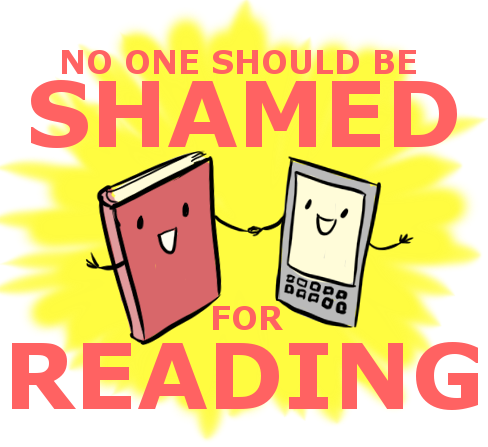
(via piratespook) adding the comment "or for not reading!" It seemed sensible to me, from my perspective as a public librarian, that not everyone wants to read. I got some pushback for this position, including a response that said if a person is proud of not reading, if they actively denigrate it, then "F them."
I find it hard to imagine myself being in a situation where someone I'm interacting with is trumpeting their hatred of reading. However, let me stretch my imagination a bit. I'm going to confine my scenario to the adult patrons I help at my job. If I had a patron who volunteered how much he or she hated reading, I would not tell them to fuck off. I would assume that they have good reasons to feel that way, most likely because people in positions of authority like mine have been telling them for most of their lives that they need to read or have to read or that they should be reading something "good" for them.
Some people have learning disabilities that makes it very difficult for them to read. Some people have been systematically taught that reading is a chore that must be completed. Some people just don't like reading AND THAT IS OKAY. I have many, many adult patrons who do not use the library for books. But if I wanted information about the interesting movies that are going to be coming out soon, I know just who I would ask. If I wanted to know one patron's opinion of the best one-hit wonders of the 60s and 70s, he would tell me in a heartbeat. I may read more than 100 books a year, but they know a hell of a lot more than I do about the media they consume.
Modern libraries are about more than books,* they are about providing access to stories--both the stories people want or need to consume, and those they create using the tools we provide them (with their tax dollars). If we limit ourselves to a rigid definition of "read or get the fuck out," we are doing ourselves, and our patrons, a great disservice. Let's not presume to judge any other person's reading, watching, listening, or internet browsing choices.**
The only choices that I am qualified to judge are my own.
There is nothing shameful about choosing not to read.
Meditation Index
*Note: I am not saying that libraries don't need books.
**And while we're at it, let's dispense with the concept of "guilty pleasures"--everyone is entitled to like what they like.

